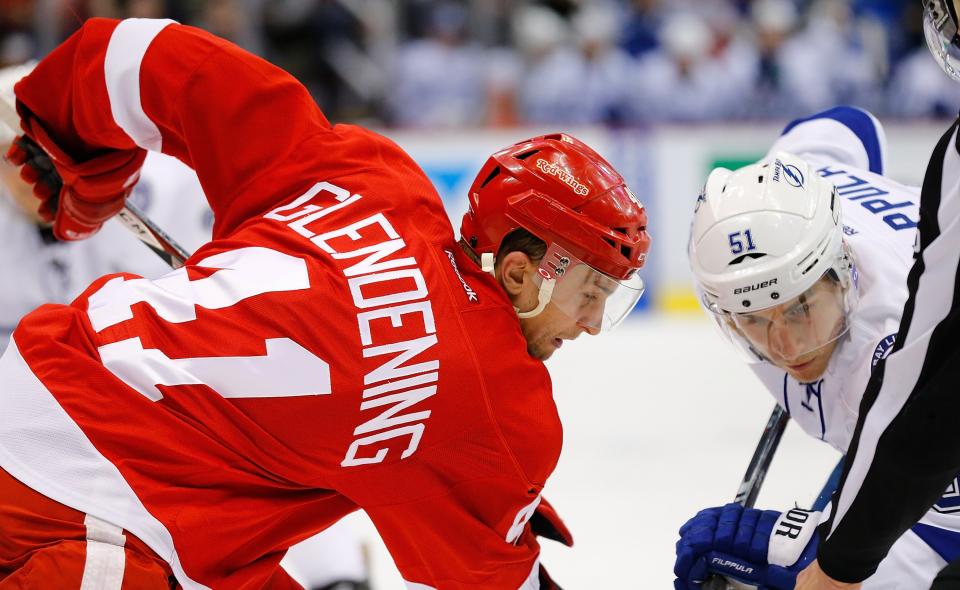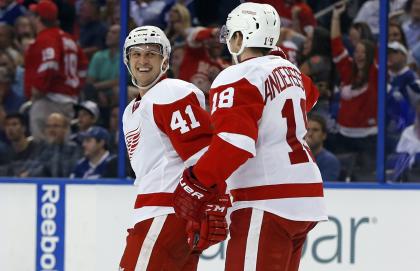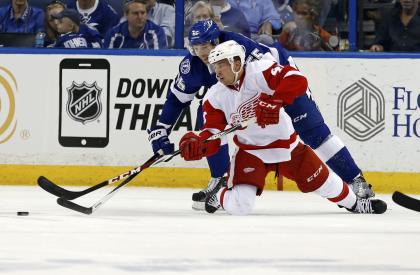Red Wings' secret weapon 'in a real groove' against the Lightning

The Detroit Red Wings lost Thursday night – and lost control of their first-round series with the Tampa Bay Lightning – because of an injury to …
Luke Glendening?
That’s why Tyler Johnson came alive so suddenly? That’s why the Bolts stormed back with two goals in 77 seconds late in regulation and another in overtime, stealing a 3-2 victory at Joe Louis Arena and tying the series 2-2?
Really?
Well, it wasn’t the only reason. But it just goes to show you how critical matchups can be and how quickly things can turn in the playoffs, and you have to know the whole story, including how Glendening went up against Johnson in the Calder Cup final between these teams’ AHL affiliates two years ago.
“I think when you’re having as much success as Detroit was having in that game and you lose a significant piece of that, certainly I’m sure it was a factor,” said Jeff Blashill, the coach of the Wings’ AHL affiliate, the Grand Rapids Griffins. “Not to say that the guys who ended up on the ice against Johnson couldn’t keep him in check, because they’re great players. But obviously Luke was in a real groove.”

By now you probably know Johnson’s inspiring story. Cut by a team in the USHL, he became the most valuable player of the WHL playoffs and won a Memorial Cup in 2008. Undrafted by teams in the NHL, he became a finalist for the Calder Trophy, which goes to the league’s rookie of the year, when he had 24 goals and 50 points last season. He had 29 goals and 72 points this season. Not bad for a guy who is supposed to be too small at 5-foot-8, 183 pounds.
But Glendening has an inspiring story, too. He wasn’t drafted by teams in the NHL, either. He signed with the Wings as a free agent, reported to camp with the Griffins and ended up with the ECHL’s Toledo Walleye.
“To be honest, when our training camp started, I cut Luke as quick as I could,” Blashill said. “He was our first guy cut and sent down.”
Glendening went to work and won over the coaching staff in Toledo. Ryan Martin, the Wings’ assistant general manager, who had played a large role in signing him, pushed Blashill to bring him back. Finally, Blashill did – and moved him from wing to center.
“He did a good job right away,” Blashill said. “Right away I realized I’d made a mistake in sending him down.”
Glendening showed he could be a shutdown centerman, especially after he improved on faceoffs. He could skate with top players. He could be hard on them physically. But most important, he could think with them.
“Lots of guys who think the game well play at a relaxed pace,” Blashill said. “Lots of guys that work really hard don’t always think the game [really well]. Luke plays extraordinarily hard and yet is an elite thinker. He knows how to angle. He’s not a pure puck-watcher. He knows how to stay with his man and be aware of where the puck is. He knows how to get his stick on the puck in passing lanes. He knows how to get his stick on the puck before guys shoot.”
The Griffins faced the Syracuse Crunch in the 2013 Calder Cup final, which featured 15 players who have appeared in this series – not to mention coach Jon Cooper, who has gone from the Crunch to the Lightning.
Blashill matched up Glendening against Johnson – virtually all the time at home with the last line change, as much as he could on the road. Johnson entered that series with nine goals and 17 points in 12 games. He had one goal and four points in six games against the Griffins. Glendening had one goal and three points as the Griffins won the championship.
“We thought it was a real good matchup, and it proved to be a real good matchup,” Blashill said. “Not that Tyler didn’t get his chances, not that he wasn’t an impact player, because he was. He certainly was one of the better players in the series. But ultimately Luke did a real good job of keeping him in check as much as you can.”
Wings coach Mike Babcock was watching. Glendening went on to play most of last season and all of this season in the NHL in a defensive role, while chipping in one goal and seven points in 56 games and 12 goals and 18 points in 82 games this season.

Babcock has matched up Glendening against Johnson in this series much like Blashill did, especially in Detroit with the last change. Glendening held Johnson off the scoresheet in Game 3, which the Wings won, 3-0. He was holding him off in Game 4, which the Wings were leading, 2-0. He actually had the same offensive numbers Johnson did in the series: two goals.
But with 7:20 to go in Game 4, Glendening shoved Johnson from behind into the boards in the neutral zone, and he and Lightning defenseman Victor Hedman took roughing penalties afterward. The Wings felt Johnson embellished. Johnson would disagree.
“I didn’t think that was a very clean play,” Johnson said.
However you felt about the hit, it did two things: it put Glendening out of the game – he suffered a cut on a hand in the ensuing scrum and needed stitches – and woke up Johnson.
“They’re gunning for him,” said Lightning center Brian Boyle. “When someone’s gunning for you, in a way it’s a compliment. They know what he’s capable of, and they want to get him off his game and contain him. That’s something that every team does to opposing players when they’re elite players. It’s to be expected. He answered pretty loud and clear.”
Johnson scored a 4-on-4 goal with 5:26 to go, flying past the Wings’ Darren Helm – their fastest skater – and beating goaltender Petr Mrazek. Would Glendening have made a difference? Maybe not. “I’m not so sure if he’d be out there on the 4-on-4,” Cooper said.
Then Johnson set up the tying goal with 4:09 to go, threading a pass from the right-wing corner through three Wings and finding Ondrej Palat in front. Would Glendening have made a difference? Believe it or not, probably. It’s sounds like sacrilege, and you’ll never hear the Wings say it. But Pavel Datsyuk – a three-time winner of the Selke Trophy as the NHL’s best defensive forward – is guilty of staring at the puck on occasion. Palat sped in front of defenseman Jonathan Ericsson and behind Datsyuk, whose stick wasn’t in the passing lane.
Finally, Johnson scored the winner 2:25 into overtime. Palat won a battle along the boards with Datsyuk and defenseman Danny DeKeyser. The Bolts had a 3-on-1 rush. Victor Hedman passed from right to left across the low slot, and Johnson buried the puck into an open net. Would Glendening have made a difference? Maybe, if he had kept the puck in the Tampa Bay end or gotten back to cover Johnson. Maybe the game wouldn’t have gone to OT at all.
“I thought we had them in big-time trouble,” Babcock said. “For whatever reason when we lost Glenny, they got energy, and we didn’t, and they made some plays.”
Datsyuk, Ericsson, Helm and DeKeyser all are capable of better. Losing Glendening is no excuse. Still …
“He’s just an extremely responsible player, and there’s not a lot of guys out there like the Glendenings,” Cooper said. “He’s done a heck of a job on our guys. To lose a player that plays an extremely important role for them. ... We look back now because we came back to win the game, so it was potentially was a huge factor, but he’s a good player for them, so there’s no question it had an effect.”
Amazing how big an effect, isn’t it?
MORE NHL COVERAGE ON YAHOO SPORTS:

 Yahoo Sports
Yahoo Sports 